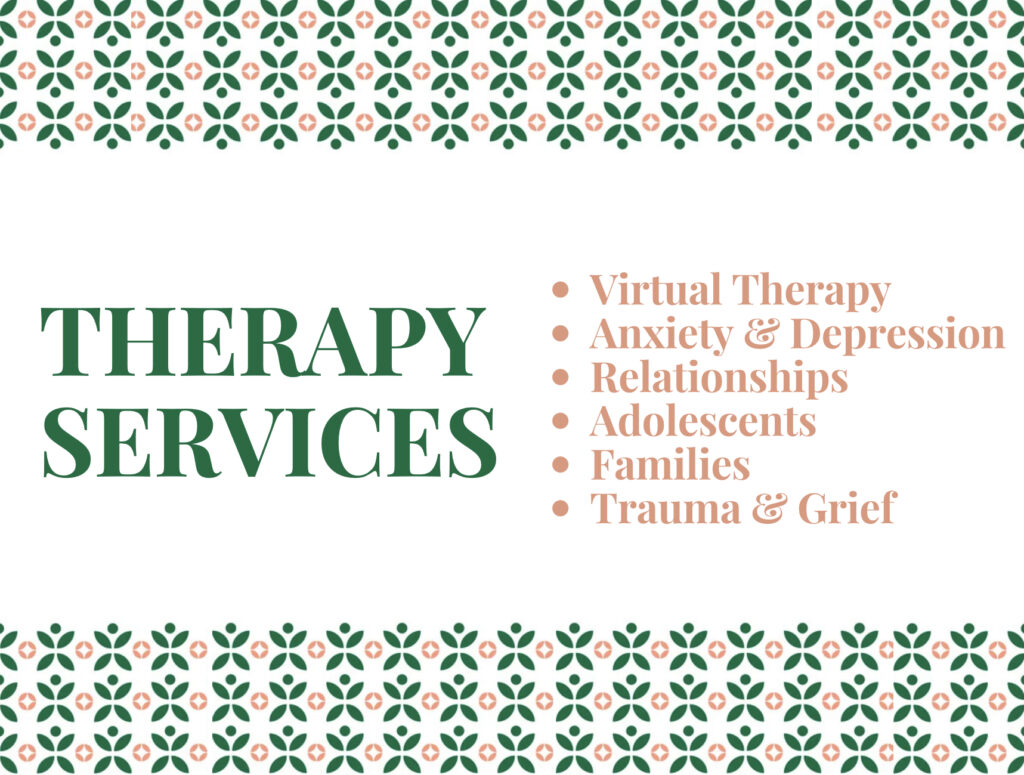
Relationship Therapy
Relationships take work…
But any relationship worth having is worth making the effort.
Whether the dynamic is romantic, platonic, or familial, there are always going to be challenges.
Naturally, patterns that can make it tough to navigate those challenges arise.
Relationship therapy can help provide more clear visibility and stronger communication. It also provides a safe space to help you navigate in the right direction, whether you’re dealing with a one-off conflict or a more deep-seated dynamic.
Relationship therapy takes an unbiased approach, with the aim of supporting the relationship itself, and not just the individuals.
Relationship therapy provides accountability to the goals set and ensures the new patterns are well-understood and begin to work in the context of your daily life. A relationship therapist can act as a guide, help lessen reactivity, as well as deepen emotional connection and safety.
Anxiety & Depression
It’s estimated that anxiety and depression affects over one third of American adults — that’s more common than the common cold.
This number has been on a steady incline for many years, causing alarm so great that the WHO and the U.S. Surgeon general have raised official concern.
Genetics, external stressors, pressure to perform at work, family challenges, relationship challenges, and the political climate are some issues that can make for a tough terrain. Whatever the reason, seeking support and learning how to apply the tools that work for you can significantly help ease the way forward.
Are you or a loved one struggling with anxiety, depression, or both? We’re here to support you.
Virtual Therapy
Did you know that almost 90% of all therapy sessions these days are virtual?
That’s right… the percentage of people who opt for online therapy has been soaring in recent years.
Are you interested in therapy, but have a hard time fitting it into your schedule?
Virtual therapy is a great solution for anyone who travels often, has a very busy schedule, or just generally feels more comfortable having a session in their own home.
Virtual therapy is the modern solution for making therapy more accessible by eliminating some of the road-blocks that might otherwise stand in the way of getting the support you need.
In fact, over half of our appointments last year were virtual!
Whether you’re looking for individual, relationship, or family therapy, virtual is possible.
Adolescent Therapy
At least 1 in 5 youth aged 9-17 years has a diagnosable mental health disorder that causes some degree of impairment, but only one third of these youth receive the necessary treatment.
We’re in the midst of an adolescent mental health crisis, but mental health care is not yet normalized to the point of routine maintenance.
The lack of proper recognition and treatment of mental health disorders among adolescents is the main perpetuator of this crisis.
Providing the proper mental health support options can help treat and prevent suffering in children and teens.
Adolescent therapy differs from adult therapy in many ways. Depending on the child’s unique needs and disposition, we provide hands-on support in a warm and welcoming manner.
The younger kiddos at KCC love engaging with play therapy, where they are able to express and process their emotions through an interactive and fun space.
Family Therapy
Family dynamics are complex, to say the least.
Family therapy provides a safe space to talk, problem solve, connect, heal and move forward.
No matter your family’s stage of life, we are here to help you navigate the stressors that arise in the family system.
Our counselors will guide your family through sessions to move from interactions that are increasing tension at home to a flow of communication and support between family members.
Trauma & Grief
Trauma and grief are similar in that they both come in two forms: essentially, obvious and unobvious.
Obvious trauma is that which you are clearly aware of, like a specific incident that deeply impacted you. Unobvious trauma encapsulates everything else that could be subconsciously processed as traumatic and happened perhaps a bit more passively.
Similarly, obvious grief happens when you lose someone or something that you love deeply. Unobvious grief is called secondary grief, and it happens when you witness loss through someone else, or through the news or other sources close to you.
Trauma and grief do not always onset immediately, but when left untreated for too long, they can build into a major blockage.
Addressing trauma and grief head-on can feel intimidating, but worth it in the end.
Finding the right fit in therapy…
Do you know what’s proven to be the most important factor in determining the success of therapy? Finding the right fit.
When individuals are paired with clinicians who they feel naturally connected to, the impact of their sessions is measurably more positive. Plus, finding the right fit means sticking with it and staying engaged, also resulting in a better outcome from therapy.
Therapy is about so much more than just the science behind the work — it’s about the human connection.
Here at KCC, we know how important it is to match our clients with the right clinician — not just in terms of specialty, but also in terms of personality and approach. Finding the right fit can be a roadblock for some people seeking support, but with so many gifted providers on the KCC team, we’re sure to have the right match for you.
If you’d like to learn more, email support@kennedycounselingcollective.com, or head to our contact page, here.
